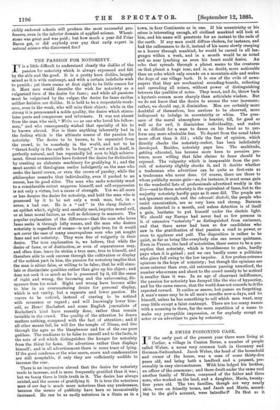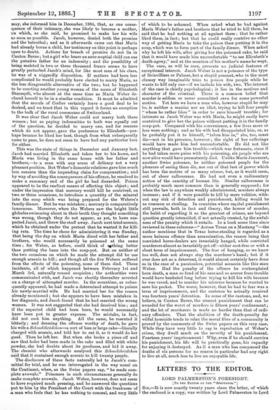A SWISS POISONING CASE.
IN the early part of the present year there were living at Cerlier, a village in Canton Berne, a number of people called Weber, a name very common both in Germany and German-Switzerland. Jacob Weber, the head of the household and owner of the house, was a man of some thirty-five years old, and being both a landlord and a peasant, pre- sumably in easy circumstances. With him lodged his brother, an officer of the commune ; and there dwelt under the same roof another family of Webers, composed of the father and three sons, who worked on the land, and a daughter, Maria, twenty- four years old. The two families, though not very nearly akin, were on friendly terms, and Jacob and Maria, accord- ing to the girl's account, were betrothal Be that as it
may, she informed him in December, 1884, that, as one conse- quence of their intimacy, she was likely to become a mother, on which, as she said, he promised to make her his wife as soon as possible. Jacob, however, denied both the promise and the betrothal ; and as it afterwards came out that Maria had already borne a child, her testimony on this point is perhaps open to doubt. Actions for breach of promise do not lie in Canton Berne ; but a girl who bears an ante-nuptial child can sue the putative father for an indemnity ; and the possibility of being mulcted in two or three thousand francs seems to have greatly perturbed Jacob's mind, for like most men of his class, he was of a niggardly disposition. If matters had been less complicated he would probably have elected to marry Maria, as the less disagreeable alternative of the two ; but he happened to be courting another young woman of the name of Elizabeth Staempfii, who almost at the same time as Maria Weber de- clared herself to be in a similar condition. It must be admitted that the morals of Cerlier certainly leave a good deal to be desired, and we trust that in this regard it forms an exception to the bulk of the rural communes of Switzerland.
It was clear that Jacob Weber could not marry both these women ; but as paying indemnities to both was equally out of the question, he decided to marry one, and for reasons which do not appear, gave the preference to Elizabeth—per- haps because he liked her best, though from what subsequently came to pass, he does not seem to have had any particular love for either.
This was the state of things in December and January last. -Jacob had married Elizabeth and taken her to his home, and Maria. was living in the same house with her father and brothers,—to a man with any sense of delicacy not a very pleasant position. But Weber's domestic relations gave him much less concern than the impending claim for compensation ; and by way of avoiding the consequences of his offence, he resolved to make a summary end of the girl he had discarded. Poison appeared to be the readiest means of effecting this object ; and under the impression that mercury would kill he contrived, on two or three occasions, to introduce a quantity of the mineral into the soup which was being prepared for the Webers's family dinner. But he was mistaken ; mercury is comparatively innocuous. Moreover, when the Webers saw the bright little globules swimming about in their broth they thought something was wrong, though they do not appear, as yet, to have sus- pected Jacob, and threw the stuff away. Jacob next tried arsenic, which he obtained under the pretext that he wanted it for kill- ing rats. The time he chose for administering it was Sunday, that being the day on which Maria dined with her father and brothers, who would necessarily be poisoned at the same time ; for Weber, as before, could think of sthing better than putting the bane into the soup-pot. But on neither of the two occasions on which he made the attempt did he use enough arsenic to kill ; and though all the five Webers suffered from the effects of the poisoning, none of them died. These incidents, all of which happened between February 1st and March 3rd, naturally roused suspicion ; the authorities were communicated with, and Jacob was shortly thereafter arrested on a charge of attempted murder. In the meantime, as subse- quently appeared, he had made a determined attempt to poison his newly-married wife. He had married her for the reason .already mentioned ; but she appears to have been mistaken in her diagnosis, and Jacob found that he had married the wrong woman. It was not suggested that she had deceived him ; and if the expected child had been born, he would necessarily have been pat to greater expense. The mistake, in fact, -did not cost him anything. All the same, he resented it bitterly; and deeming the offence worthy of death, he gave his wife a Schmelzbrocichen—a sort of bun or large cake—literally charged with arsenic, and told her to eat it, as it would do her good. Then he left her. But when she broke a piece off and saw that holes had been made in the cake and filled with white powder, she bad doubts about its goodness, and hid it away. The chemist who afterwards analysed this Schmelzbrodchen said that it contained enough arsenic to kill twenty people.
The disclosure of these facts naturally led to Jacob's com- mittal for trial, and he was interrogated in the way usual on the Continent, when, as the Swiss papers say, " he made com- plete avowals." Prisoners in such circumstances generally do make complete avowals. Jacob Weber, however, does not seem to have required much pressing, and he answered the questions put to him by the President of the Court with the frankness of a man who feels that he has nothing to conceal, and very little
of which to be ashamed. When asked what he had against Maria Weber's father and brothers that he tried to kill them, he said that he had nothing at all against them ; that he rather liked them, in fact ; but that he could really contrive no other way of getting Maria to take the poison than putting it in the soup, which was to form part of the family dinner. When asked why he left his wife, after giving her the poisoned cake, he said that it would have made him uncomfortable "to see Elizabeth's death-agony," and at the mention of his mother's name he wept.
The case, as will be seen, presents no judicial features of exceptional interest. Jacob Weber is not a poisoner of the type of Brinvilliers or Palmer, but a stupid peasant, who in the most clumsy way imaginable tries to poison five people while he wants to kill only one—if we include his wife, two. The interest of the case is chiefly psychological ; it lies in the motives and character of the criminal. There is a common belief that murder is seldom or never committed save for some powerful motive. Yet here we have a man who, however stupid he may be, is neither a maniac nor an idiot, trying to kill four people " whom he rather likes " in order to save himself trouble ; for intimate as Jacob Weber was with Maria, he might easily have contrived to give her the poison without putting it in the family soup-pot. Compared with his convenience, a few lives more or less were nothing ; and as his wife had disappointed him, or, as he probably put it to himself, "taken him in," she, too, must die—not in his presence, however ; the sight of her sufferings would have made him feel uncomfortable. He did not like anything that gave him trouble—which was fortunate, since if he had taken more pains with his poisoning, six people who are now alive would have prematurely died. Unlike Marie Jeanneret, another Swiss poisoner, he neither poisoned people for the pleasure of seeing them die, nor out of that lust of power which has been the motive of so many crimes, but, as it would seem, out of sheer callousness. He had not even a rudimentary notion of the sanctity of human life. Similar callousness is probably much more common than is generally supposed ; for when the law is anywhere weakly administered, murders always increase ; and if it were possible to kill by mere volition, with- out any risk of detection and punishment, killing would be as common as stealing. In countries where capital punishment still prevails, both in fact and theory, the horror of murder, the habit of regarding it as the greatest of crimes, are beyond question greatly intensified, if not actually created, by the awful- ness of the penalty which it entails. In a book some time since reviewed in these columns—" Across Texas on a Mustang "—the author mentions that in Texas horse-stealing is regarded as a more heinous offence than assassination, the reason being that convicted horse-dealers are invariably hanged, while convicted murderers almost as invariably get off—either scot-free or with a short term of imprisonment. The fear of hanging, as we know too well, does not always stay the murderer's hand; but if it ever does act as a deterrent, it would almost certainly have done so in the case of a passionless, potential assassin like this man Weber. Had the penalty of the offence he contemplated been death, a man so fond of his ease and so averse from trouble would have hesitated long before trying to kill his wife because he was vexed, and to murder his mistress because he wanted to save his pocket. The worst, however, that he had to fear was a term of imprisonment, and the sentence he actually received was fourteen years' detention. In some of the cantons, and, we believe, in Canton Berne, the utmost punishment that can be awarded for the worst of murders is fifteen years' confinement ; and the lot of murderers is made no harder than that of ordi- nary offenders. That the abolition of the death-penalty for wilful homicide tends to relax the moral fibre of a community is proved by the comments of the Swiss papers on this very case. While they have very little to say in reprobation of Weber's crime, they dwell much on the severity of his punishment. Fourteen years' imprisonment ! Why, even if he should survive his punishment, his life will be practically gone, his capacity for enjoying it destroyed. As if a man who has compassed the deaths of six persons for no reason in particular had any right to live at all, much less to live an enjoyable life.



































 Previous page
Previous page